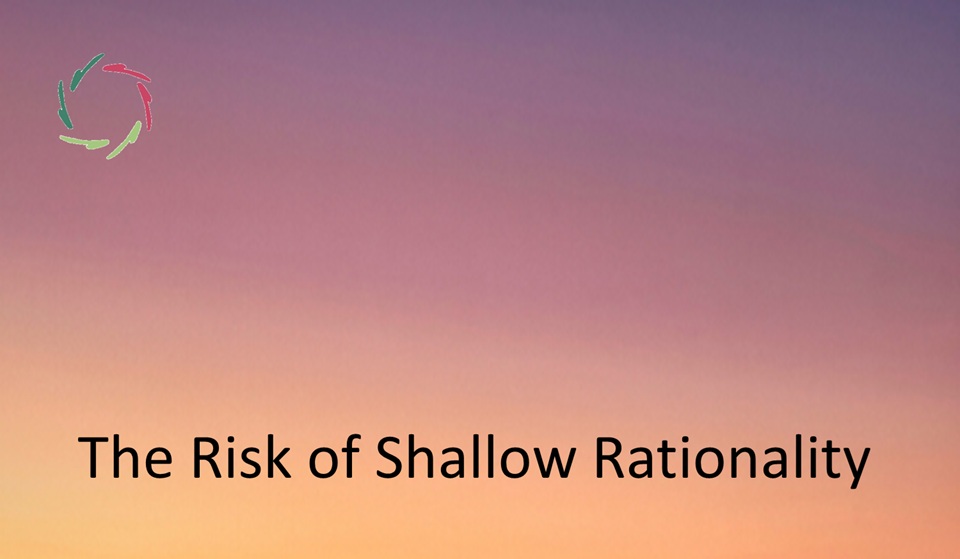The Risk of Shallow Rationality

Rationality is often praised as the ultimate safeguard against bias, error, and manipulation. It gives us structure, helps us organize information, and allows us to make logical decisions. But what happens when rationality itself becomes shallow?
This is where things get tricky. Shallow rationality looks like real rationality but stays on the surface, disconnected from subconscious meaning, emotional intelligence, and true openness to growth. In this way, it creates a dangerous illusion: people believe they are engaging in deep thinking, but they are simply reinforcing a rigid, pre-existing framework.
What is shallow rationality?
Not all rationality is equal. The distinction between deep rationality and shallow rationality is crucial.
Shallow rationality is:
- Superficial logic without introspection – Using reason mechanically, without questioning one’s assumptions and motivations.
- Overreliance on facts and data – Believing that accumulating more information leads to better thinking while ignoring how the mind processes and integrates knowledge.
- Debate over discovery – Seeing rationality as a tool for winning arguments rather than for exploring truth.
- Dismissing the subconscious – Ignoring that human reasoning is shaped by deeper mental-neuronal patterns, autosuggestion, and subconceptual meaning.
- Conceptual rigidity – Believing that a single framework (scientific, philosophical, or ideological) explains everything, rejecting anything that falls outside of it.
At first glance, these might seem like strong intellectual habits. But in reality, they can lead to false confidence, a lack of self-awareness, and an inability to recognize deeper truths.
How shallow rationality reinforces groupthink
One of the greatest dangers of shallow rationality is that it feeds groupthink. Many groups believe they are rational because they engage in structured debates, cite facts, and promote reasoned discourse. However, if they:
- Cherry-pick facts that confirm their worldview
- Dismiss opposing views outright without truly engaging
- Seek clarity over complexity, preferring oversimplified answers to nuanced truths
- Reject depth as ‘irrational,’ dismissing ideas that cannot be neatly quantified
… then their rationality is not truly rational at all. It has simply become another form of group identity, where ‘rational thinking’ means defending the group’s position rather than actually seeking understanding.
Many political and ideological conflicts today are not rational vs. irrational but related to shallow rationality vs. deep rationality. The real divide is between those who engage with depth and those who stay on the surface.
The illusion of objectivity
A major trap of shallow rationality is that it creates the illusion of objectivity. People assume they are objective simply because they rely on logic. But true objectivity requires more than just structured thinking. It requires self-awareness of one’s own biases and blind spots.
Someone who is rational but lacks depth may:
- Mistake certainty for truth – Feeling confident in an argument doesn’t mean it is correct.
- Ignore subconscious influences – Assuming their reasoning is purely logical when, in reality, it is shaped by deeper, often unseen, emotional forces.
- Equate skepticism with intelligence – Rejecting new ideas out of habit rather than engaging with them fully.
A crucial question to ask is: Am I thinking rationally, or am I just rationalizing my existing worldview?
The consequences of shallow rationality
The impact of shallow rationality is profound. It creates:
- Reductionism – Treating complex issues as if they have simple, linear solutions.
- Dogmatism – Becoming rigid and unyielding, mistaking personal certainty for truth.
- Lack of meaning – Rationality, when disconnected from depth, can feel cold, uninspiring, and detached from human experience.
- Inability to inspire change – Purely conceptual arguments rarely persuade people because they fail to resonate at a deeper, non-conscious level.
- Disconnection from inner growth – When rationality dismisses subconceptual processing, it cuts itself off from the true sources of insight and transformation.
Without depth, rationality loses its power to guide meaningful change — both within individuals and in society.
From shallow rationality to deep rationality
Deep rationality is not just about accumulating knowledge. It’s about understanding knowledge in context — integrating logic with meaning, self-awareness, and an openness to uncertainty.
To shift from shallow to deep rationality, one must:
- Embrace intellectual humility – Recognizing that no belief system is ever fully complete.
- Acknowledge nonconscious influences – Understanding that reasoning is shaped by deep neuronal patterns beyond explicit logic.
- Integrate meaning into rational thought – Not just seeking correctness but seeking deeper understanding.
- Become comfortable with uncertainty – Realizing that true exploration means holding space for the unknown.
How deep rationality transcends groupthink
The only way to break free from the rigidity of groupthink is to shift from shallow rationality to deep rationality.
- Instead of reinforcing identity-based belonging, deep rationality allows for continuous thought evolution.
- Instead of defining oneself against others, deep rationality seeks integration and understanding.
- Instead of dismissing depth as ‘unscientific’ or ‘irrational,’ deep rationality recognizes that depth is an essential part of human intelligence.
The future of thinking must be both rational and deep — not just structured but alive and evolving.
The need for 100% rationality and 100% depth
AURELIS proposes that rationality and depth are not opposites but essential partners. If rationality remains shallow, it will become just another form of ideological rigidity. But if it is combined with depth, self-awareness, and openness, it becomes a powerful tool for real transformation.
The key question is not simply, “Am I being rational?” but rather, “Am I thinking deeply and openly?”
True rationality must remain alive, dynamic, and deeply human. Otherwise, it risks becoming just another illusion.


